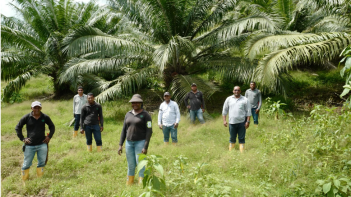The RSPO Compensation Task Force (CTF) organised a day and a half workshop with a Non-Government Organisation, Forest Trends on designing and implementing biodiversity compensation projects from 3rd to 4th February 2015 in Jakarta.
The event focused on practical aspects of designing and implementing compensation projects for RSPO growers seeking to address biodiversity liabilities related to RSPO Criterion 7.3.
The workshop saw more than 70 participants coming together from various sectors such as oil palm growers, environmental NGOs, social NGOs, certification bodies, processors and traders and financial institutions.
Key principles of biodiversity/conservation projects required by the RSPO Remediation and Compensation Procedures were also quite thoroughly discussed at the workshop. Participants understand the key principles (Additionality, long-lasting, knowledge based and equitable) better and were able to clarify questions related to the aforementioned principles.
“Forest Trends was pleased to have this opportunity to begin to help RSPO growers think through implementation options of their compensation obligations for previous land clearance without prior HCV assessment. Meeting those obligations and honoring the RSPO commitment to not clear such land going forward will make a significant contribution to biodiversity conservation in Southeast Asia, and wherever RSPO growers work.” said Patrick Maguire, Program Manager of Forest Trends.
In addition, options for delivering compensation were discussed, such as on-plantation efforts by the company, off-site work partnering with other organisations, for example ekosistem restorasi and hutan desa models in Indonesia, and conservation banking. Participants began to consider how to design and implement biodiversity projects that would satisfy RSPO compensation requirements as well as review and evaluate proposed biodiversity/conservation projects that were submitted to them.
The workshop was made very interactive as participants were involved in break-out sessions to brainstorm ideas and the results were presented at the workshop.
The workshop presentation materials can be downloaded here (PDF).
Keep reading

Access into prisma

Updated Trace Function in prisma

Call for Expression of Interest: Independent Investigation of a Complaint

Latin American Smallholders, Key Global Brands Gather in Peruvian Amazon to Advance Sustainable Palm Oil

RSPO Forum for Members and Certification Bodies 2025: Strengthening Capacities and Building Bridges with RSPO Members

From Violence to Prosperity: Cultivating Sustainable Palm Oil in San Pablo, Colombia

Palmas de Tumaco: Enduring, Trusting, and Transforming in Colombia’s Pacific Coast
Carry Over Credits for Certified Independent Smallholder Groups




